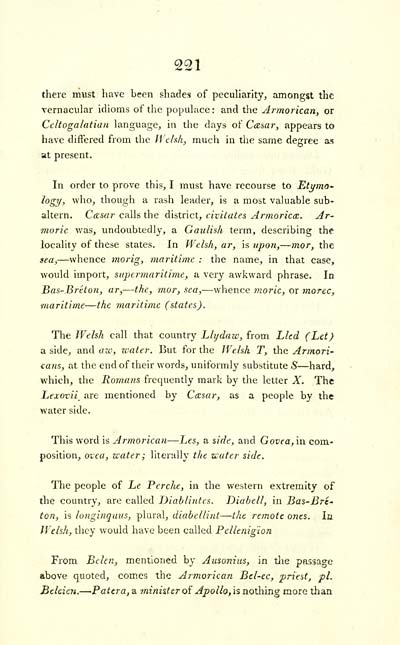Blair Collection > Celtic researches, on the origin, traditions & language, of the ancient Britons
(311)
Download files
Complete book:
Individual page:
Thumbnail gallery: Grid view | List view

221
there must have been shades of peculiarity, amongst the
vernacular idioms of the populace : and the ylrmorican, or
Ccltoga/atian language, in the days of Casa?', appears to
have differed from the Wchh, much in the same degree as
at present.
In order to prove this, I must have recourse to EtymO'
iogy, who, though a rash leader, is a most valuable sub-
altern. Casar calls the district, civitates Annoric<E. At-
moric was, undoubtedly, a Gaulish term, describing the
locality of these states. In Welsh, ar, is upon, — mor, the
sea, — whence morig, maritime : the name, in that case,
Avould import, saptrmaritime, a very awkward phrase. In
Bas-Brtton, ar, — the, mor, sea, — whence moric, or morec,
maritime — the maritime (states).
The Welsh call that country Llijdaw, from Lied (Let)
a side, and azv, zcater. But for the Welsh T, the Armori'
cans, at the end of their words, uniformly substitute S — hard,
which, the Romans frequently mark by the letter X. The
Lexovii^ are mentioned by C<E,sar, as a people by the
water side.
This word is Armorican — Les, a side, and Govea,\n com-
position, ovca, water; literally the zcater side.
The people of Le Perche, in the western extremity of
the country, are called Diablintes. Diahell, in Bas-Bré'
ton, is longinquus, plural, diabellrnt — the remote ones. In
Welsh, they ΛνοηΜ have been called Pellenig'ion
From Bekn, mentioned by Ausonius, in tlie passage
above quoted, comes the Armorican Bel-ec, priest, pi.
Belciert. — Patera, a miniiter of Apollo, is nothing more than
there must have been shades of peculiarity, amongst the
vernacular idioms of the populace : and the ylrmorican, or
Ccltoga/atian language, in the days of Casa?', appears to
have differed from the Wchh, much in the same degree as
at present.
In order to prove this, I must have recourse to EtymO'
iogy, who, though a rash leader, is a most valuable sub-
altern. Casar calls the district, civitates Annoric<E. At-
moric was, undoubtedly, a Gaulish term, describing the
locality of these states. In Welsh, ar, is upon, — mor, the
sea, — whence morig, maritime : the name, in that case,
Avould import, saptrmaritime, a very awkward phrase. In
Bas-Brtton, ar, — the, mor, sea, — whence moric, or morec,
maritime — the maritime (states).
The Welsh call that country Llijdaw, from Lied (Let)
a side, and azv, zcater. But for the Welsh T, the Armori'
cans, at the end of their words, uniformly substitute S — hard,
which, the Romans frequently mark by the letter X. The
Lexovii^ are mentioned by C<E,sar, as a people by the
water side.
This word is Armorican — Les, a side, and Govea,\n com-
position, ovca, water; literally the zcater side.
The people of Le Perche, in the western extremity of
the country, are called Diablintes. Diahell, in Bas-Bré'
ton, is longinquus, plural, diabellrnt — the remote ones. In
Welsh, they ΛνοηΜ have been called Pellenig'ion
From Bekn, mentioned by Ausonius, in tlie passage
above quoted, comes the Armorican Bel-ec, priest, pi.
Belciert. — Patera, a miniiter of Apollo, is nothing more than
Set display mode to: Large image | Transcription
Images and transcriptions on this page, including medium image downloads, may be used under the Creative Commons Attribution 4.0 International Licence unless otherwise stated. ![]()
| Early Gaelic Book Collections > Blair Collection > Celtic researches, on the origin, traditions & language, of the ancient Britons > (311) |
|---|
| Permanent URL | https://digital.nls.uk/75767316 |
|---|
| Description | A selection of books from a collection of more than 500 titles, mostly on religious and literary topics. Also includes some material dealing with other Celtic languages and societies. Collection created towards the end of the 19th century by Lady Evelyn Stewart Murray. |
|---|
| Description | Selected items from five 'Special and Named Printed Collections'. Includes books in Gaelic and other Celtic languages, works about the Gaels, their languages, literature, culture and history. |
|---|

